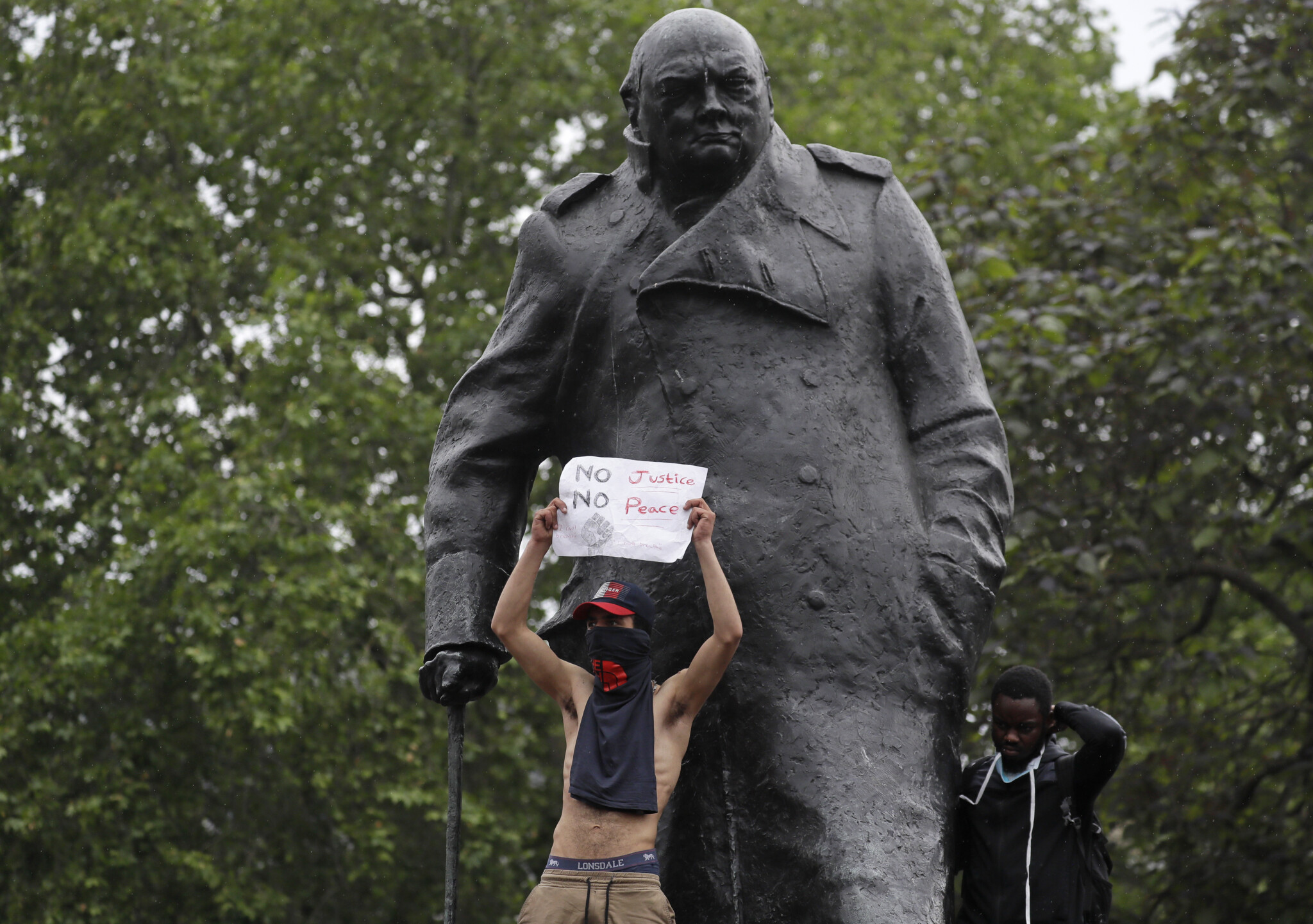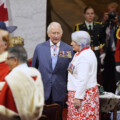Imagine trying to have a leisurely chat with an old man who begins to hold forth about a jumble of half-understood historical anecdotes. When these are exhausted, he launches into a conspiratorial rant about international currency exchanges and inchoate explanations for the outbreak of the Second World War. If you happened to catch Tucker Carlson’s interview with Vladimir Putin earlier this year, you do not need to imagine such an interaction.
And if you caught Tucker’s podcast more recently, you might have noticed a much younger man—a millennial, in fact—discoursing in much the same mode. It was a farrago of half-truths and falsehoods, and the weirdest part of it centred on the Second World War, its causes, and the leadership of the main belligerents. This was Carlson’s interview of Darryl Cooper, an internet pseudo-historian of the 20th century.
Cooper’s exposition of WW2 historiography is riddled with errors, omissions, and exaggerations. Churchill, says Cooper, was really a warmonger, a terrorist, and the “chief villain” of WW2; what everyone else calls the Holocaust was an accidental by-product of logistical failures; and Hitler just wanted peace with the British Empire and, as Cooper has noted elsewhere, “an acceptable solution to the Jewish problem.” Those are only the most bizarre of Cooper’s claims, and all have been usefully analysed and debunked by Victor Davis Hanson and Sohrab Ahmari, not to mention numerous corrective threads on X.
The trouble is not incomplete information, but rather the premise from which Cooper begins. He assumes not only that WW2 is “just profoundly misunderstood,” but that it is also misinterpreted in a specific way for a specific reason. We are not allowed, Cooper says, to question any aspect of WW2 or the interwar period, because it is all “such a core part of a state religion.” Cooper seems to believe that there is an official history of WW2, that governments forbid the questioning of that narrative, and, since that is the case, that narrative must be false.
That reasoning is obviously fallacious and is easily refuted. There is, for instance, a school of thought (famously exemplified in English by the historian A. J. P. Taylor) whereby Nazism was not an aberration from, but the fulfillment of, the whole course of German history and a profound flaw in the German character. Hitler was accordingly a German statesman like any other but only more so—a view which is arguably more unsettling than Cooper’s caricature whereby the Weimar Republic suddenly “turned into demons,” as he says, and elected Hitler.
Now, the internet is full of cranks; and such a haystack of untruths, half-truths, and exaggerations would not normally excite comment. But Cooper’s interview clearly struck a nerve. The impetus was Cooper’s claim that the story of WW2 is “a core part of a state religion” and “the founding myth of the global order that we’re living in now.” “We’re going to get to a point,” he says, “where the interwar period and the Second World War are far enough away that people start taking a more honest look at everything that went on.” Cooper, like many internet crackpots, never makes his point explicit. But what he seems to suggest is this: American supremacy is illegitimate because it is founded on an erroneous narrative of WW2; exposing the errors of that narrative will accordingly undermine that dominance.
Once again: none of that reasoning follows logically. But there is a very obvious sense in which victory in WW2 is indeed the foundation of the liberal world order and present-day American hegemony. Confronting both forms of totalitarianism in Europe was in the interest of the Anglo-American world, even if it meant the loss of the British Empire. Cooper has suggested in a tweet that Nazi domination of Europe would have been preferable to the events of real history. But, leaving that odd claim aside, it made sense to knock out the Nazis first since they occupied Europe’s industrial heartland, and they could not be allowed to get any stronger than they already were.
It made sense, moreover, to destroy the Nazis in cooperation with the people who had the most to lose from Nazi ambitions in Eastern Europe: the Soviet Union. This was a brief alliance of convenience, which no one expected to last long. But instead of a direct military confrontation with the USSR, America and her allies created the international system that still exists, along with NATO, the United Nations, the World Bank, the General Agreement on Tariffs and Trade, the European Union, and all the rest of it, in order to insulate the free world against Soviet encroachment and to wait patiently for its collapse. American historian Sarah C. Paine has a clear and succinct exposition of those developments and their significance here.
The plan worked. The entities and arrangements of liberal or rules-based order have all outlasted the Soviet Union; and as frustrating as they can be, they are better than the alternative of armed conflict between world powers. Nevertheless, many people are very unhappy with them, and sometimes for strange reasons. Cooper and his ilk vastly overstate the extent to which those international institutions have drifted to the Left. They have indeed done so, but far less than, say, your typical city council in almost any Western country. That said, a contemporary leftist slant could hardly have been built into the international system in the 1940s, and more recent ideological developments were arguably caused by conservative indifference and failure to remain engaged.
But it isn’t just the liberal international order and American hegemony. Unfortunately, WW2 is also part of the myth of 20th-century totalitarianism and 21st-century autocracy. Victory in that war gave legitimacy (if that is the right word) to the domination of Eastern Europe by the USSR. And the myth of the Great Patriotic War, as the Russians call WW2, is the main principle of post-Soviet Russian nationalism. The theory that the defeat of the Nazis may not have been complete is one of the most implausible excuses for the Russian invasion of Ukraine, and yet it is repeated incessantly by Russian domestic propaganda to the effect that destroying the “Nazi regime” in Kyiv will finish the job that the Red Army once started.
There is, of course, no truth to that propaganda. Perhaps that is where “a more honest look” at WW2 could more usefully begin. We can start with the fact that ideology was no barrier to cooperation between the Third Reich and the Soviet Union. In fact, the USSR did more than anyone else to enable Nazism and to encourage WW2. I am not thinking only of the Molotov-Ribbentrop non-aggression pact, but also of the German-Soviet Trade and Credit Agreement (both signed in 1939) which gave the Nazis the resources they needed to begin the war despite the British naval blockade of Germany. And on the eve of the war, both ideological states were said to be united in mutual opposition to the capitalist democracies of the West. That is what the Soviet chargé d’affaires Georgi Astakhov said to the German diplomat Julius Schnurre a few weeks before the signing of the Molotov-Ribbentrop Pact.
That state of affairs will always pose a problem for Soviet and Putinist triumphalism. Or rather it would pose a problem if the facts were widely known. But the problem doesn’t end here, because Western liberalism, alas, does not emerge unscathed from WW2. Just as the Nazis and Soviets cooperated when it suited them, so too did the capitalist Allies make common cause with the USSR for the reasons I described above. A gigantic amount of economic and military aid flowed into Moscow to help defeat the Third Reich, and the USSR would almost certainly have been destroyed without it—though no Soviet or latterly Russian apologist will admit this.
And, speaking of Russian apologists, the transformation of the Soviet victory in WW2 into a story of Russian triumphalism is the worst of the “profound misunderstandings” of WW2 mythology. The Soviet Union lost some 27 million people in that war, but only about half were Russian. And if we view war dead as a percentage of population, Belarus, Ukraine, Latvia, and Armenia were hardest hit with respective death tolls at 25 percent, 16 percent, 13.7 percent, and 13.6 percent. And yet, the Russian sacrifice in the Great Patriotic War was the only one that was ever officially acknowledged in the Soviet Union, lest the self-conception of other nationalities take root too deeply. One of the many lies at the centre of the Soviet system was that it was an international union and not the Russian Empire back from the dead. Putin’s zombie imperialism is ironically more honest in this regard.
The time will come soon when not only all participants in WW2 are dead, but so is everyone who knew them. My young children are unusually lucky in having known their nearly 100-year-old great-grandfather for a short while before he died. He had fought in WW2, and my kids are unlikely to meet another veteran. I grew up hearing my own grandparents talk constantly of the war they lived through and fought in, and it almost felt as though WW2 was still a current event. Those days are over now. Soon there will only be second-hand memories, and these will fade unless we can keep them alive. If we don’t, the outcome will not be a “more honest look” at anything, but oblivion and ignorance.










